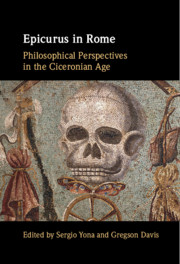Book contents
- Epicurus in Rome
- Epicurus in Rome
- Copyright page
- Contents
- Illustrations
- Contributors
- Acknowledgements
- Chapter 1 Introduction
- Part I Epicurus and Roman Identities
- Part II Epicurus and Lucretian Postures
- Chapter 7 “Love It or Leave It”: Nature’s Ultimatum in Lucretius’ On the Nature of Things (3.931–962)
- Chapter 8 Kitsch, Death and the Epicurean
- Chapter 9 Page, Stage, Image: Confronting Ennius with Lucretius’ On the Nature of Things
- Chapter 10 Lucretius on the Size of the Sun
- Bibliography
- General Index
Chapter 10 - Lucretius on the Size of the Sun
from Part II - Epicurus and Lucretian Postures
- Epicurus in Rome
- Epicurus in Rome
- Copyright page
- Contents
- Illustrations
- Contributors
- Acknowledgements
- Chapter 1 Introduction
- Part I Epicurus and Roman Identities
- Part II Epicurus and Lucretian Postures
- Chapter 7 “Love It or Leave It”: Nature’s Ultimatum in Lucretius’ On the Nature of Things (3.931–962)
- Chapter 8 Kitsch, Death and the Epicurean
- Chapter 9 Page, Stage, Image: Confronting Ennius with Lucretius’ On the Nature of Things
- Chapter 10 Lucretius on the Size of the Sun
- Bibliography
- General Index
Summary
This paper offers a provocative re-reading of the passage about the sizes of the sun, moon, and stars late in Lucretius’ De Rerum Natura (5.564-613). Attention to not only details of argumentation but also shades of meaning and contorted syntax shows a more complex, ambiguous presentation than generally acknowledged. This paper suggests that Lucretius' narrator—rather than merely parroting wrong, ridiculed doctrines—pulls student-readers into the process of inquiry. It becomes the didactic audience’s task to receive data from sense-perception and use lessons learned earlier in the poem in making correct judgments based upon that data. In Epicurean and Lucretian accounts of reality, the senses themselves are infallible; so the Lucretius-ego’s assertion that the sun as big as perceived by our senses must also be infallible. But our interpretation of what that assertion entails about the sun’s actual size is a matter of judgment, and thus fallible and uncertain indeed.
- Type
- Chapter
- Information
- Epicurus in RomePhilosophical Perspectives in the Ciceronian Age, pp. 168 - 185Publisher: Cambridge University PressPrint publication year: 2022

